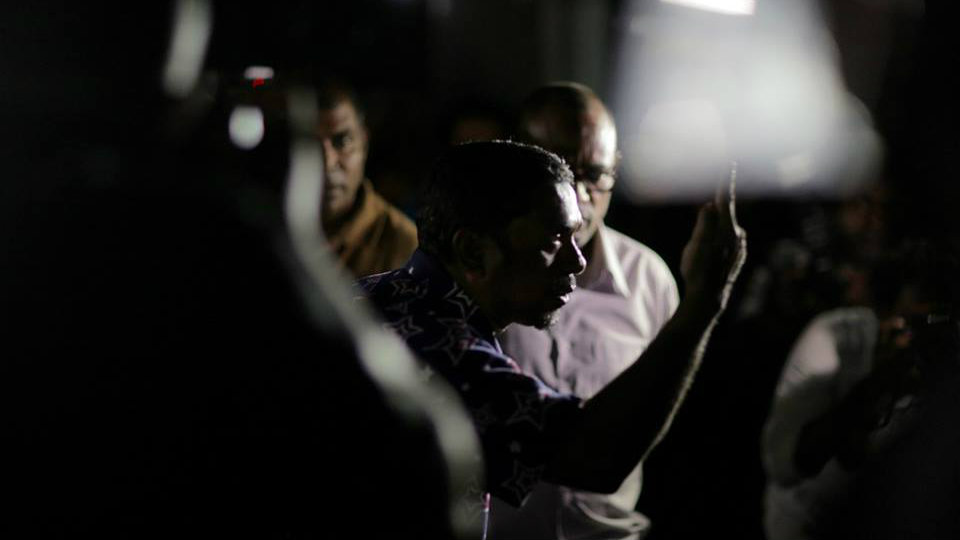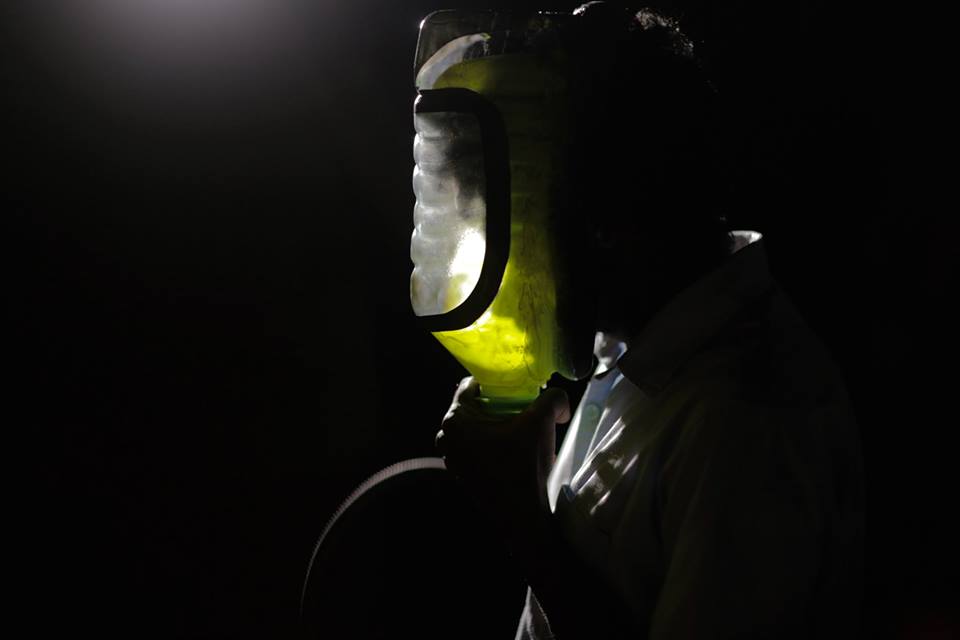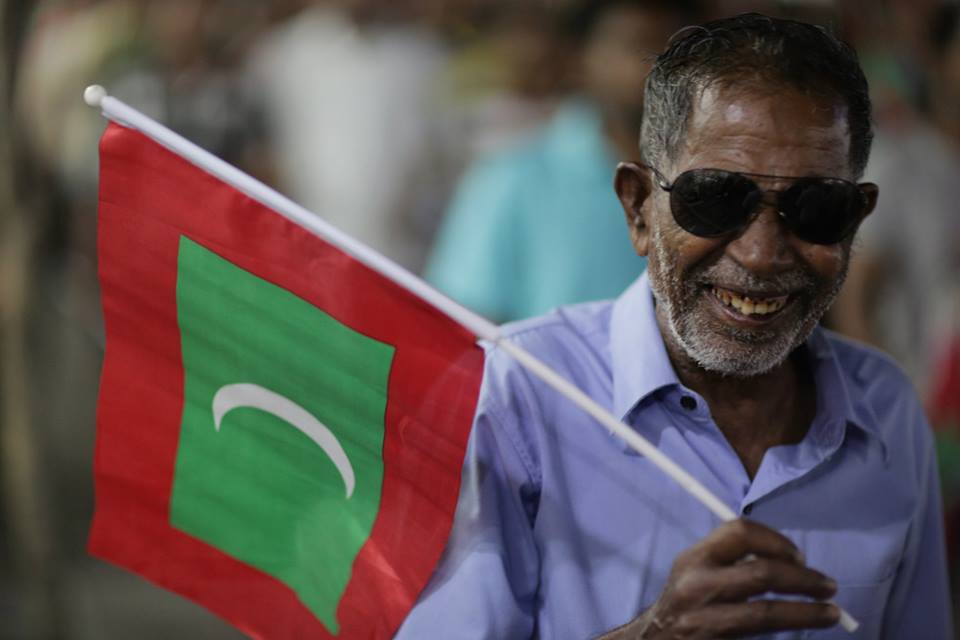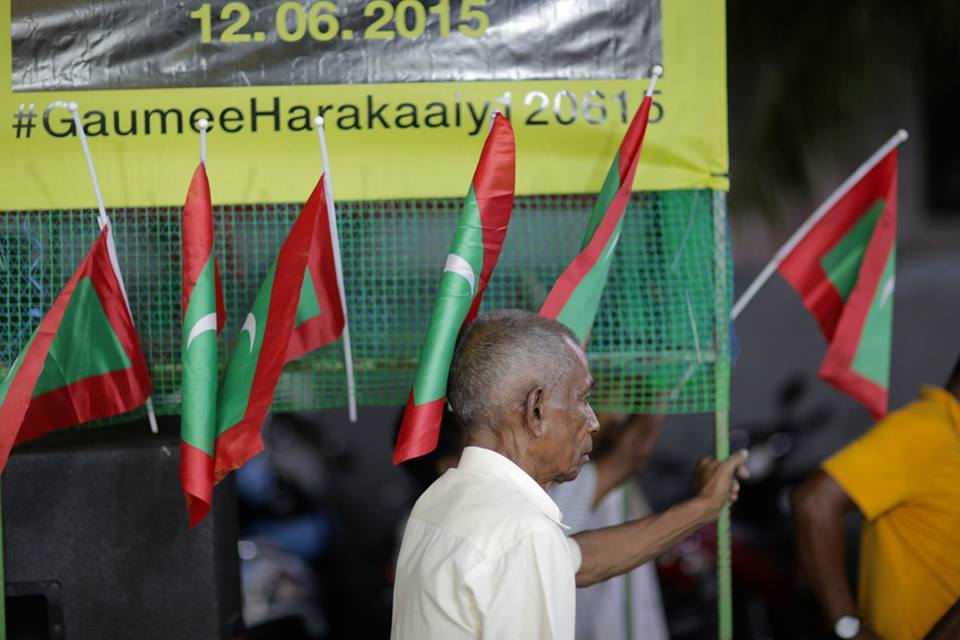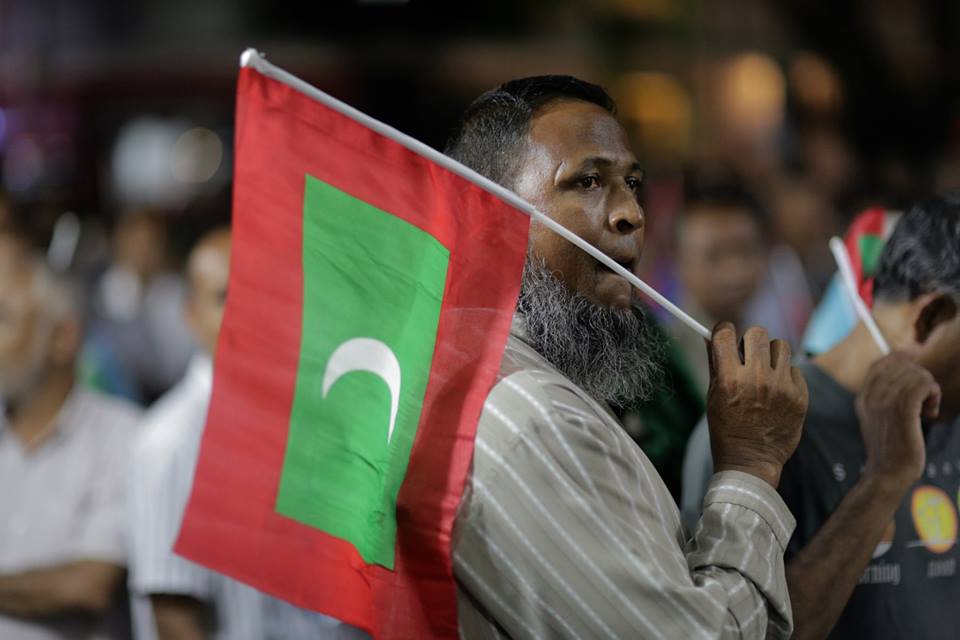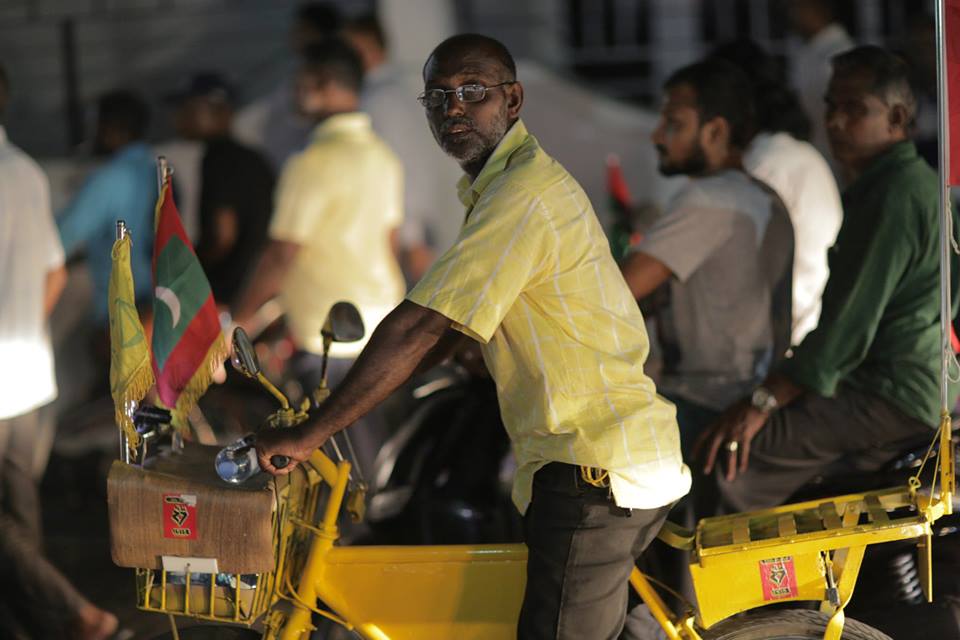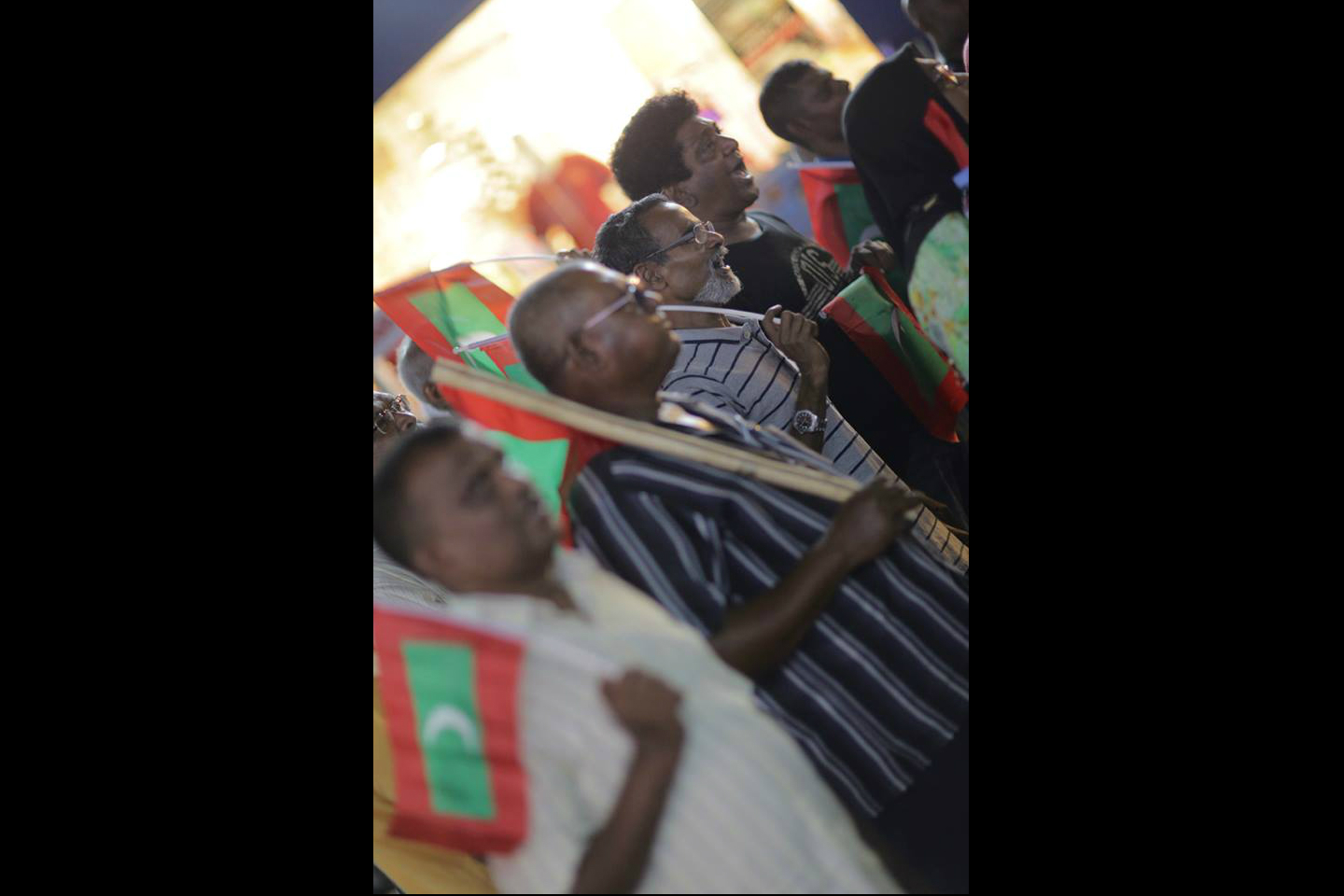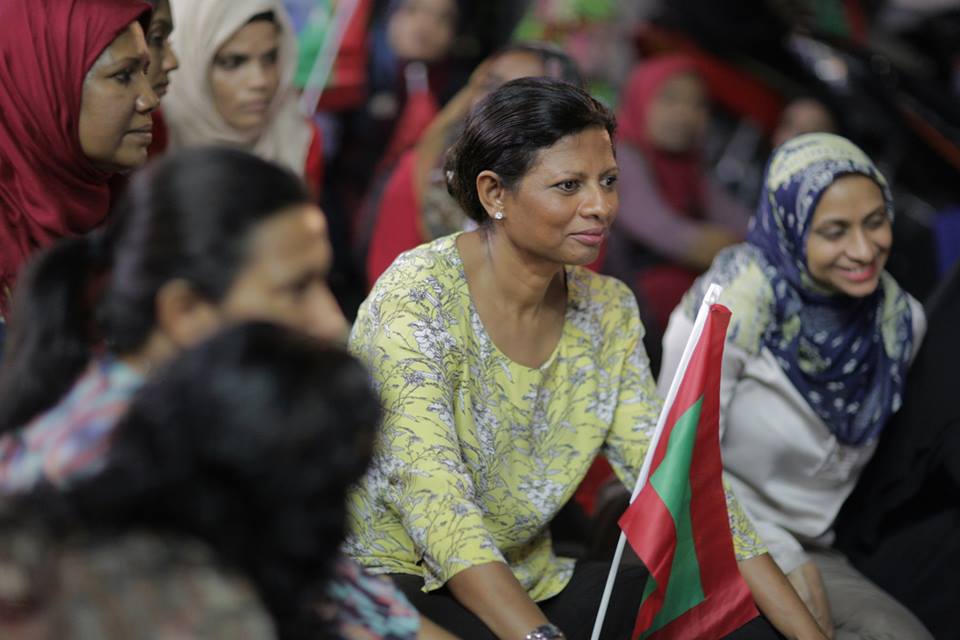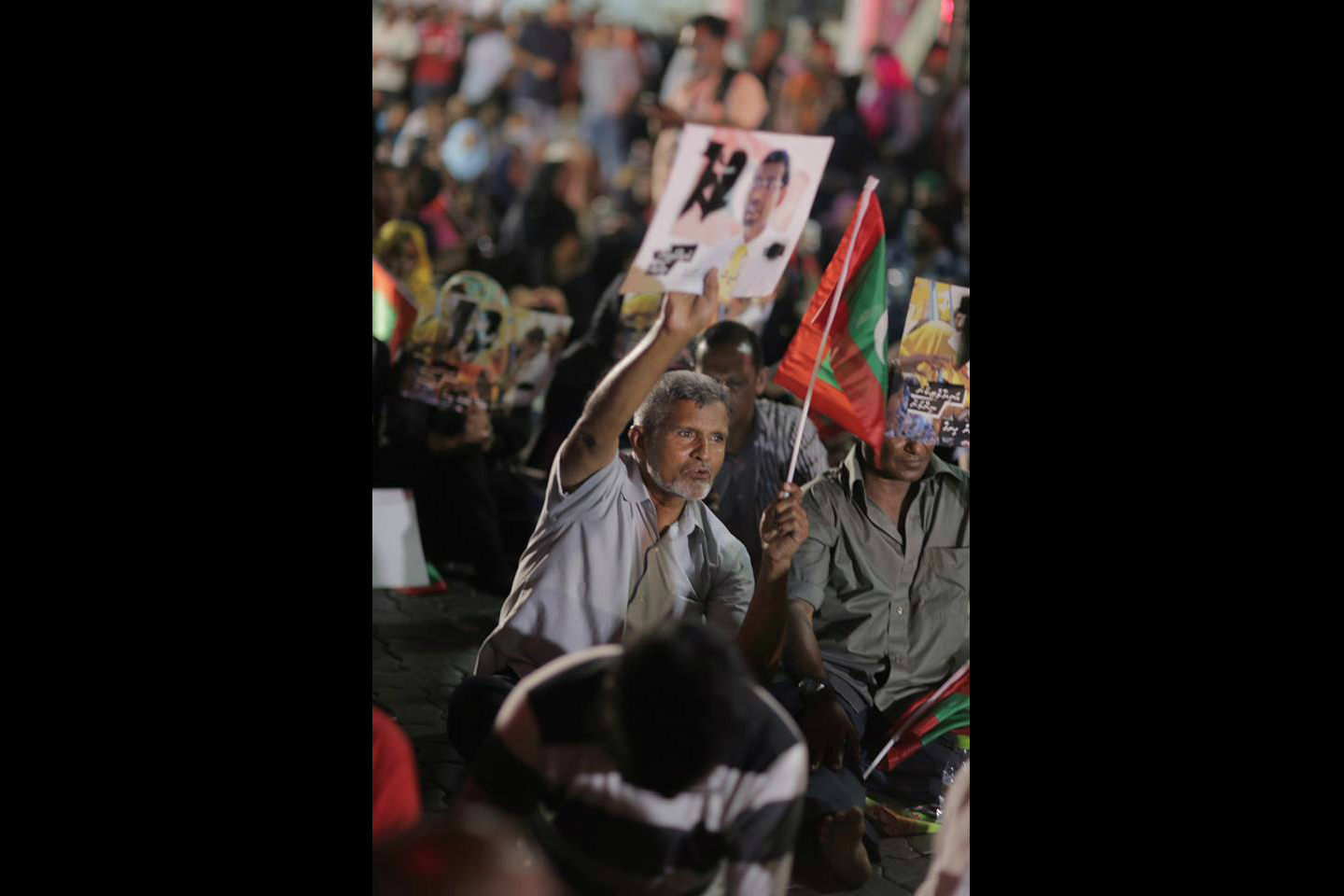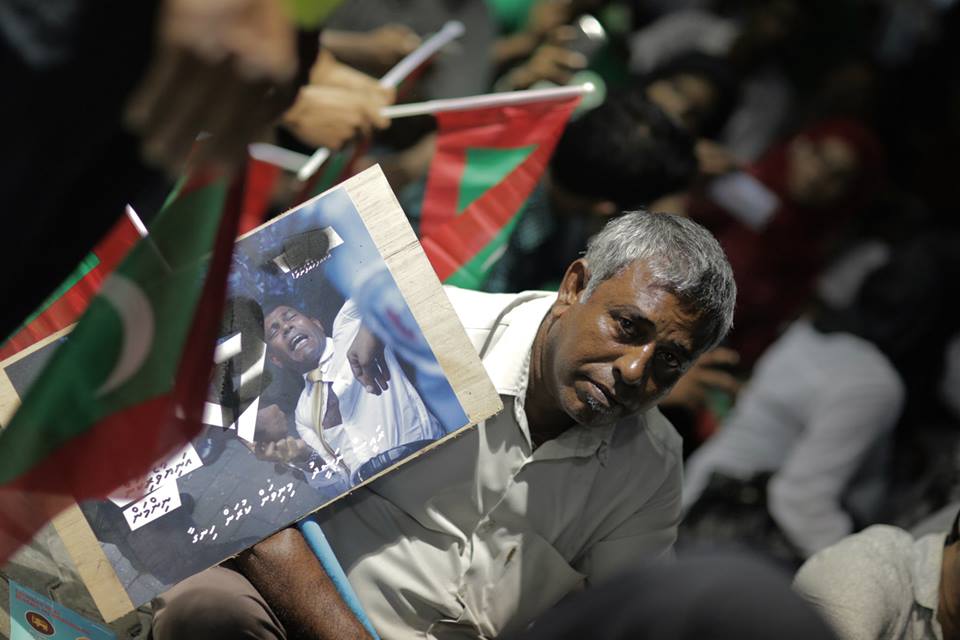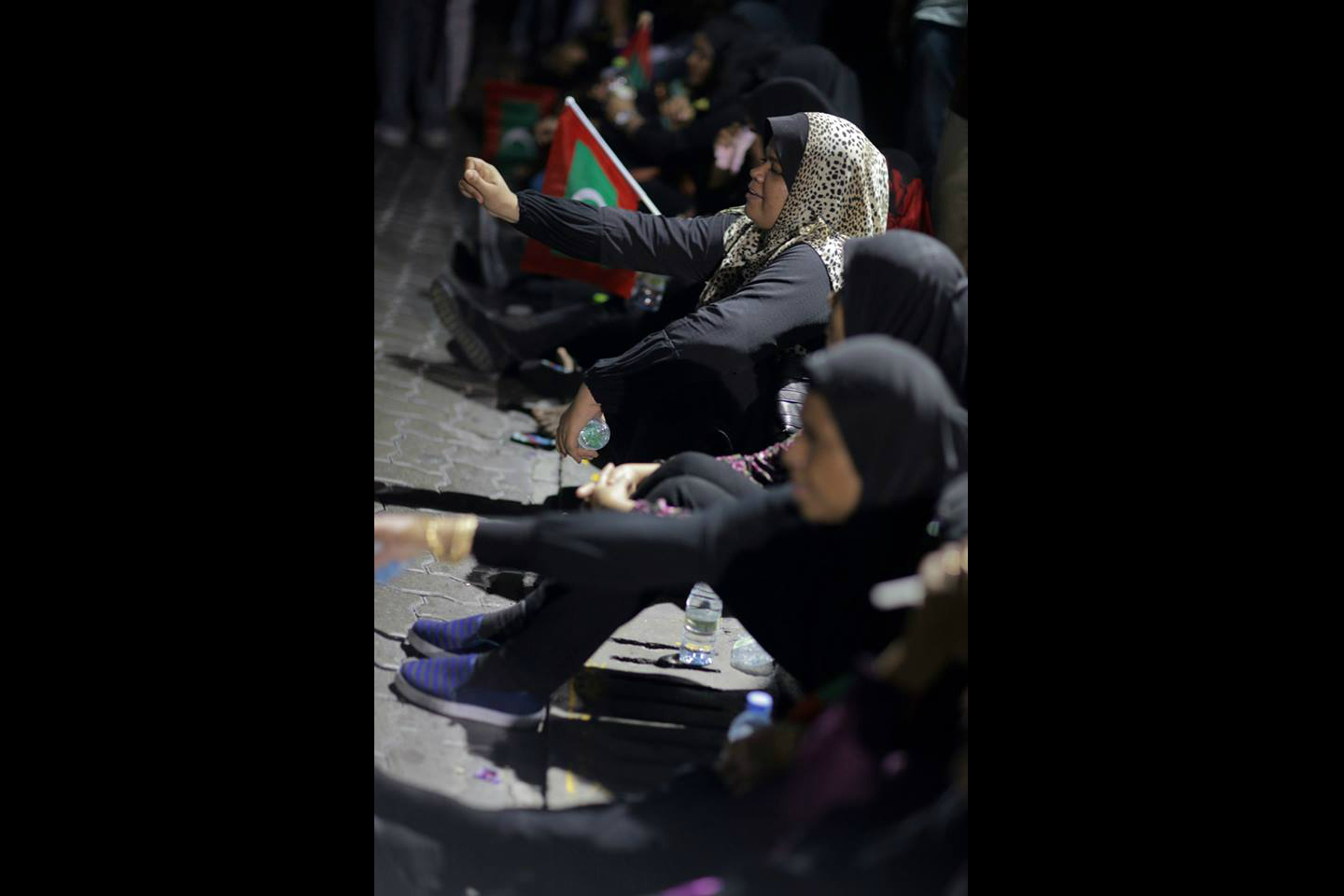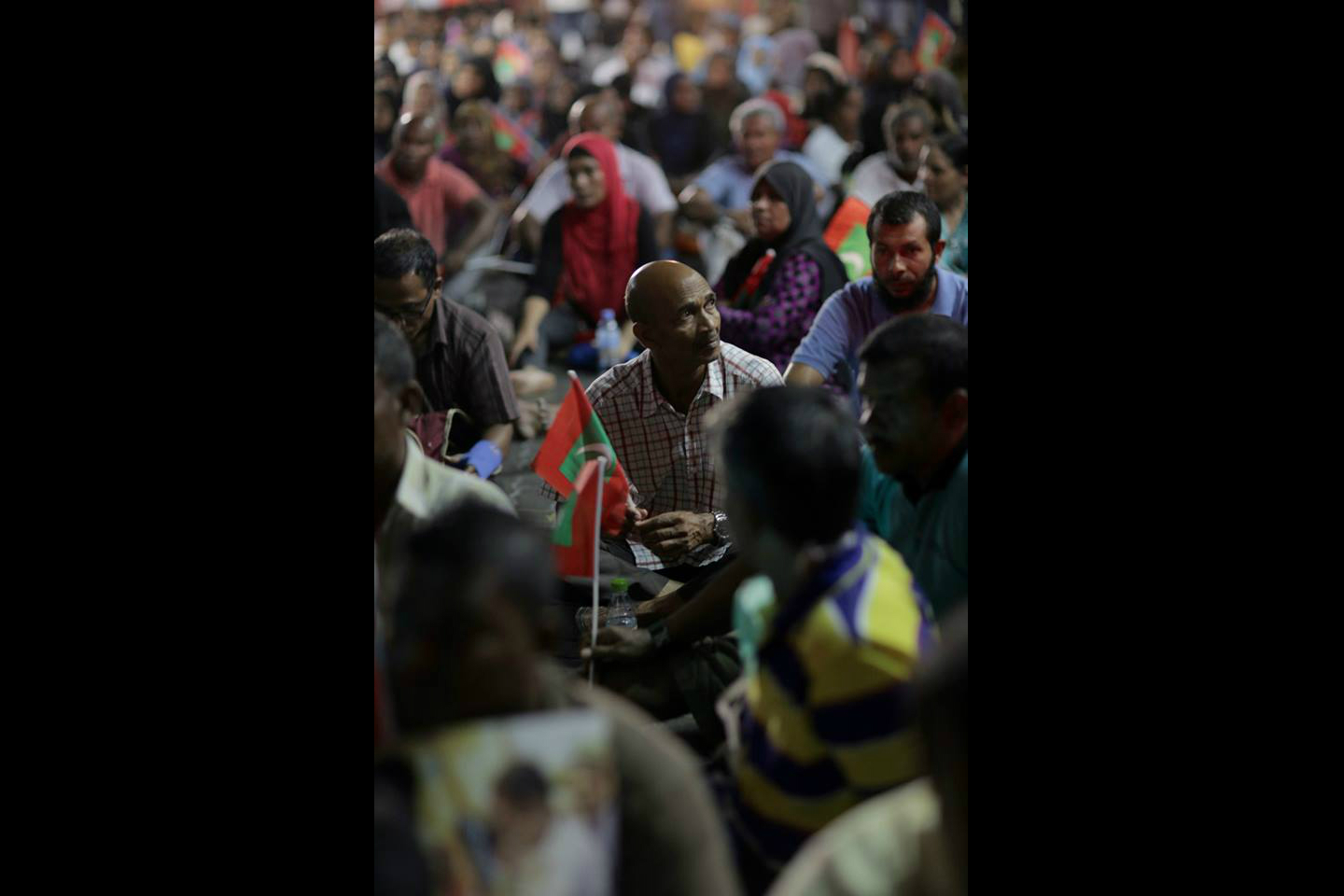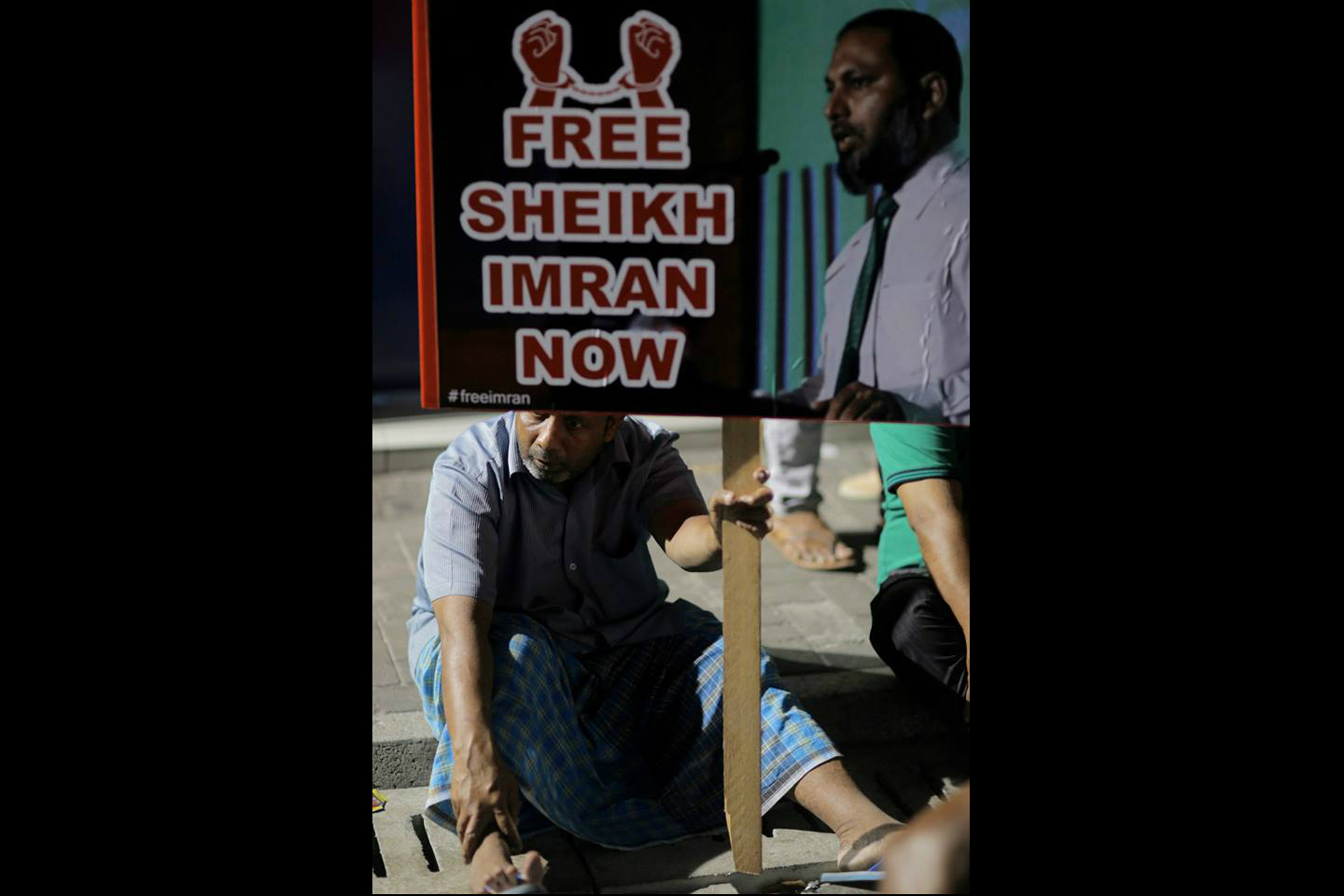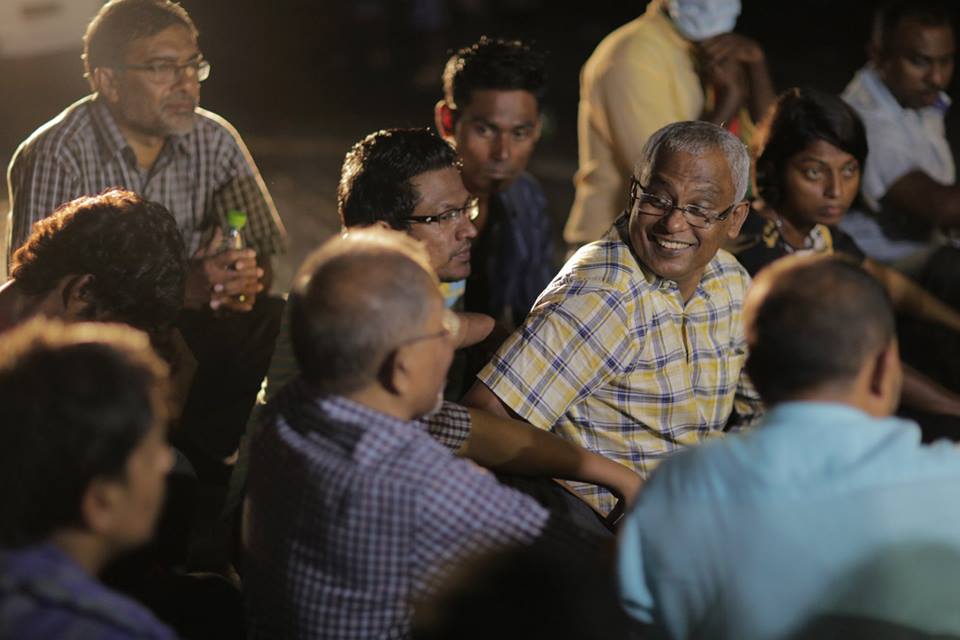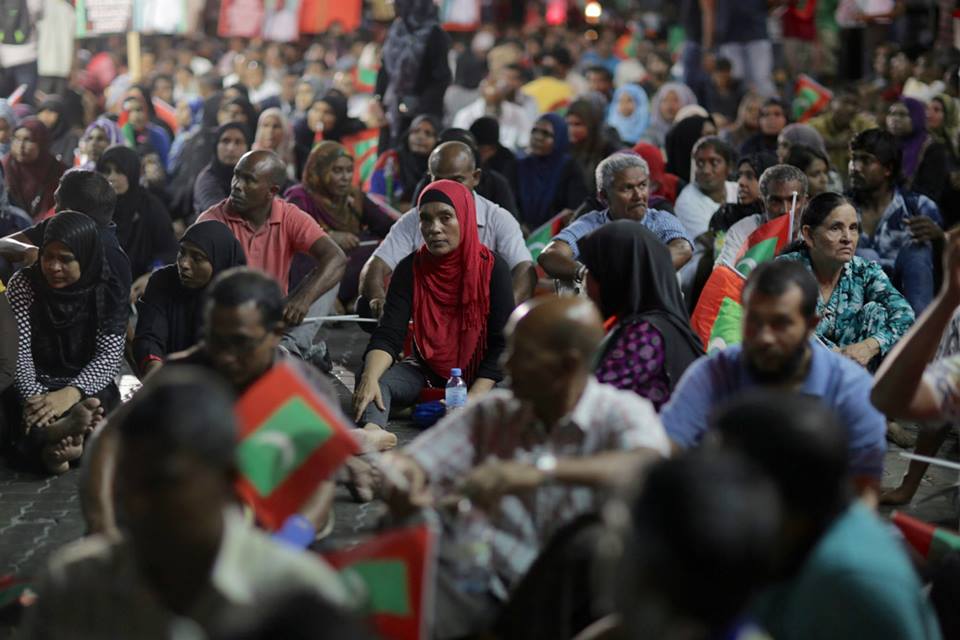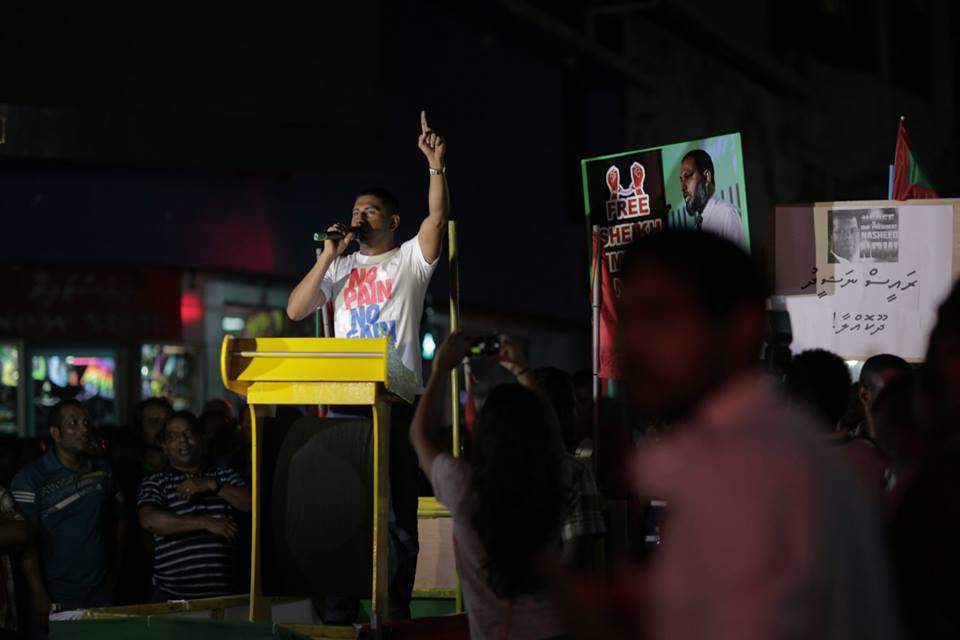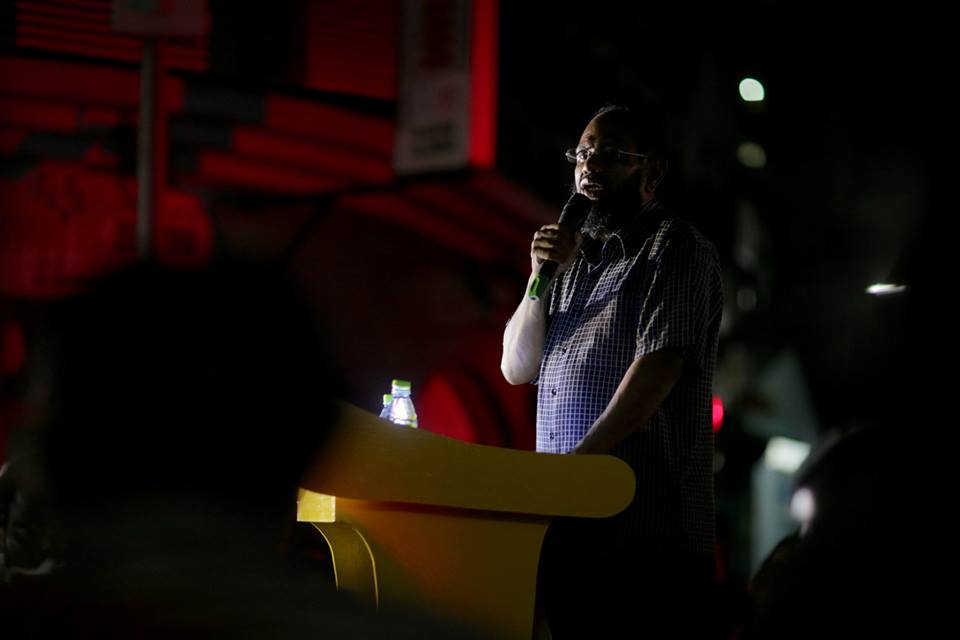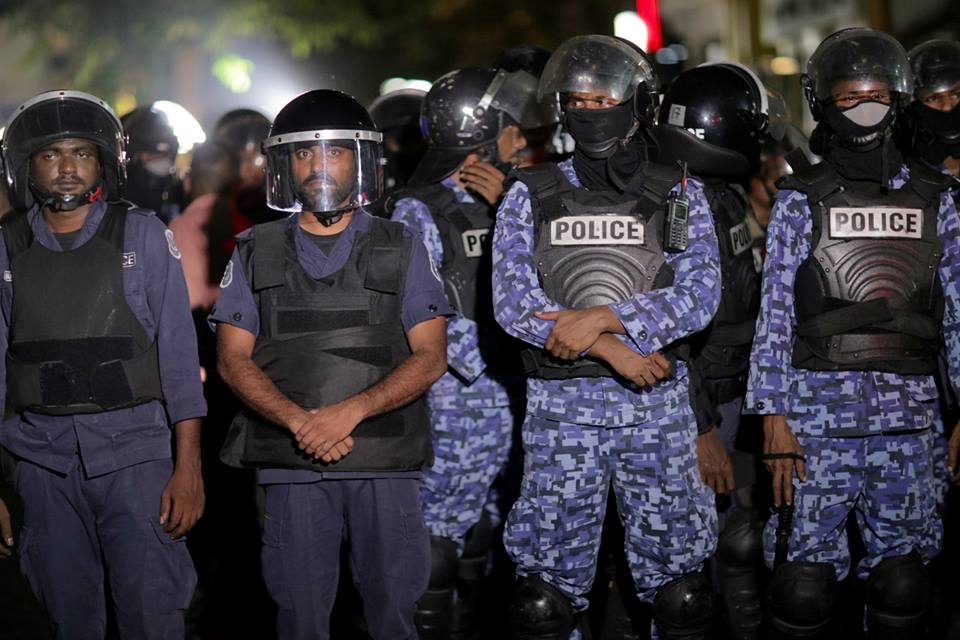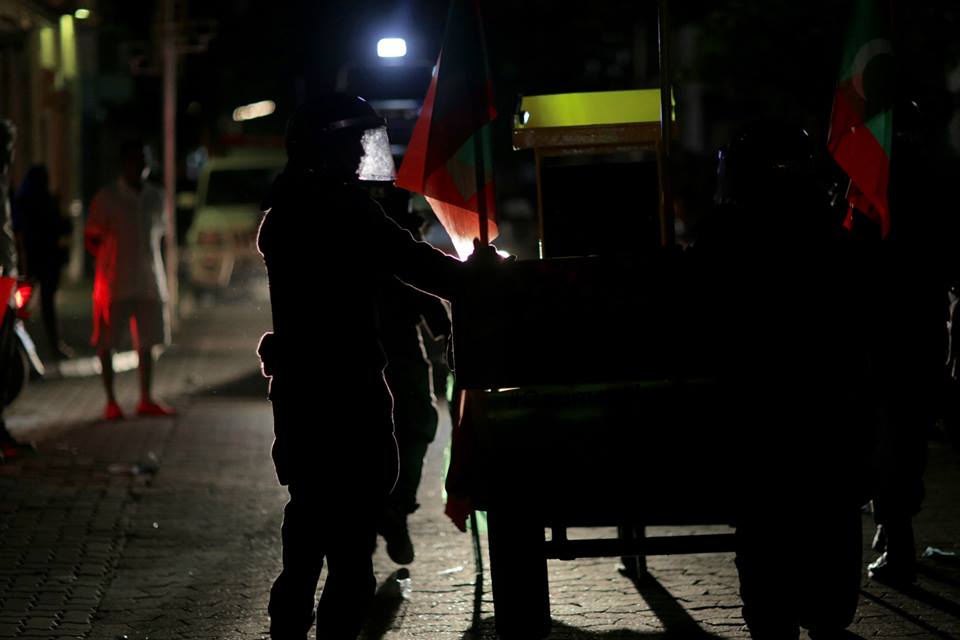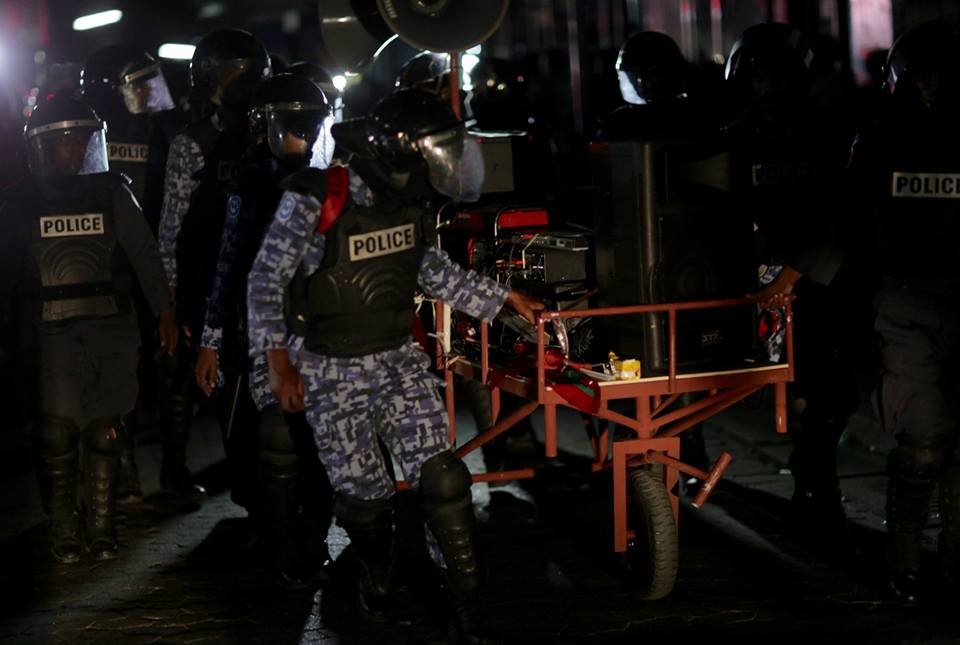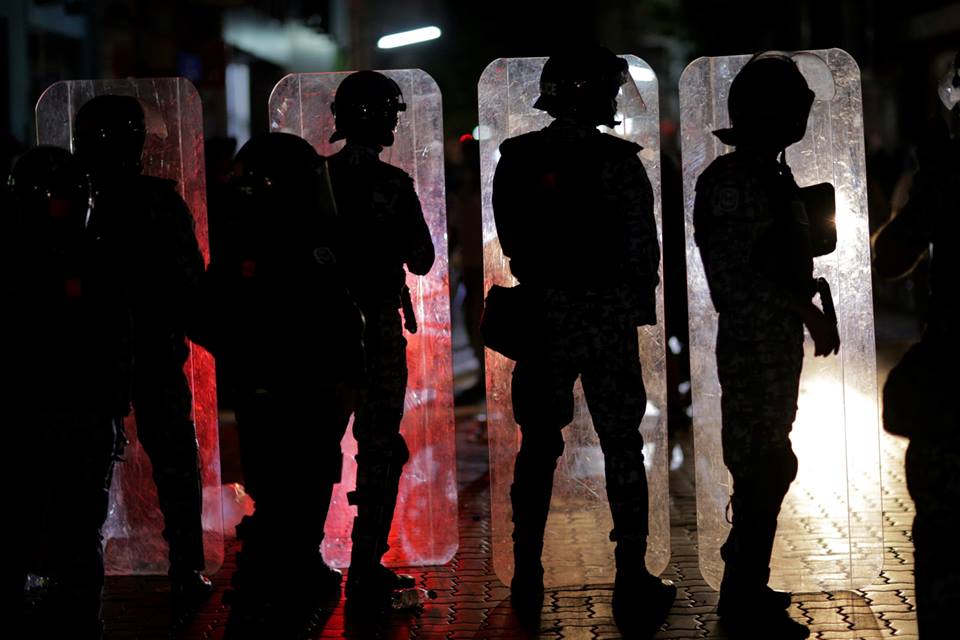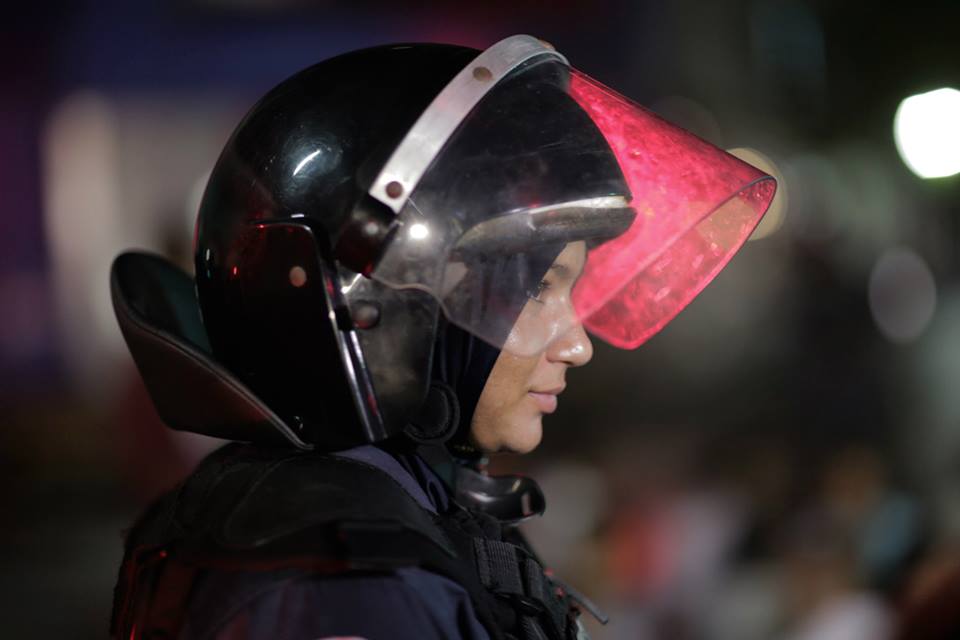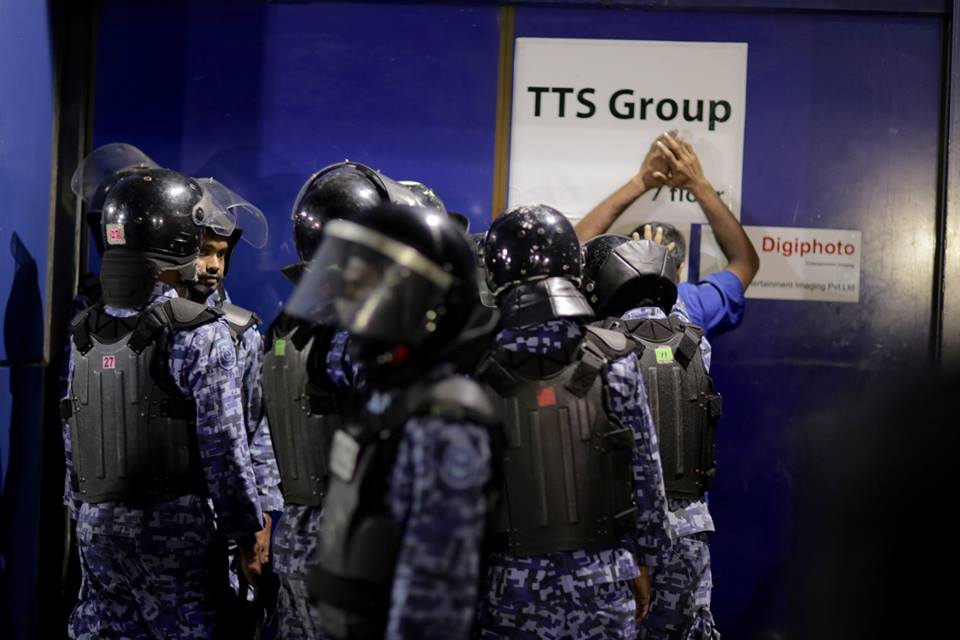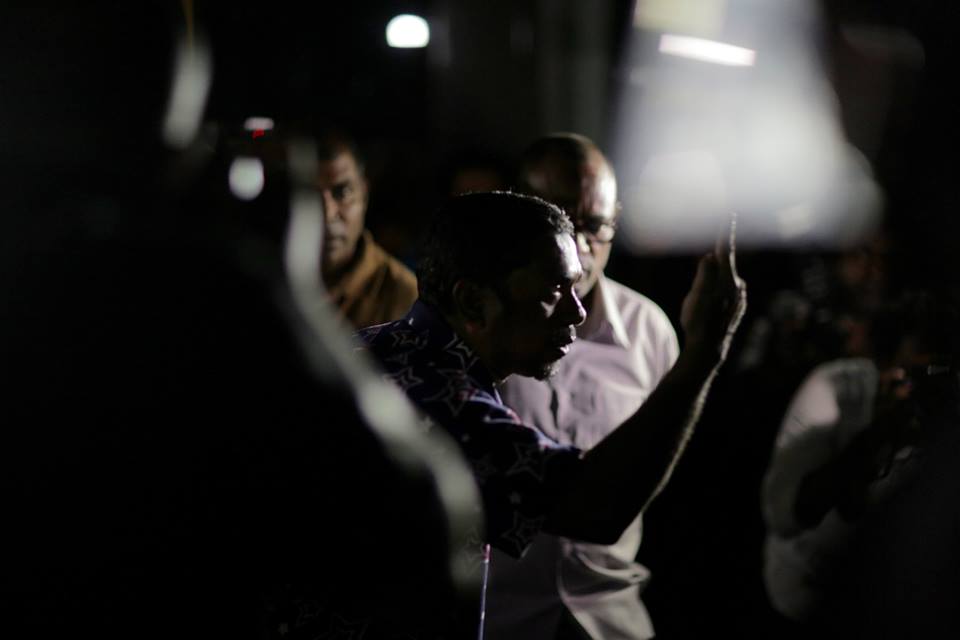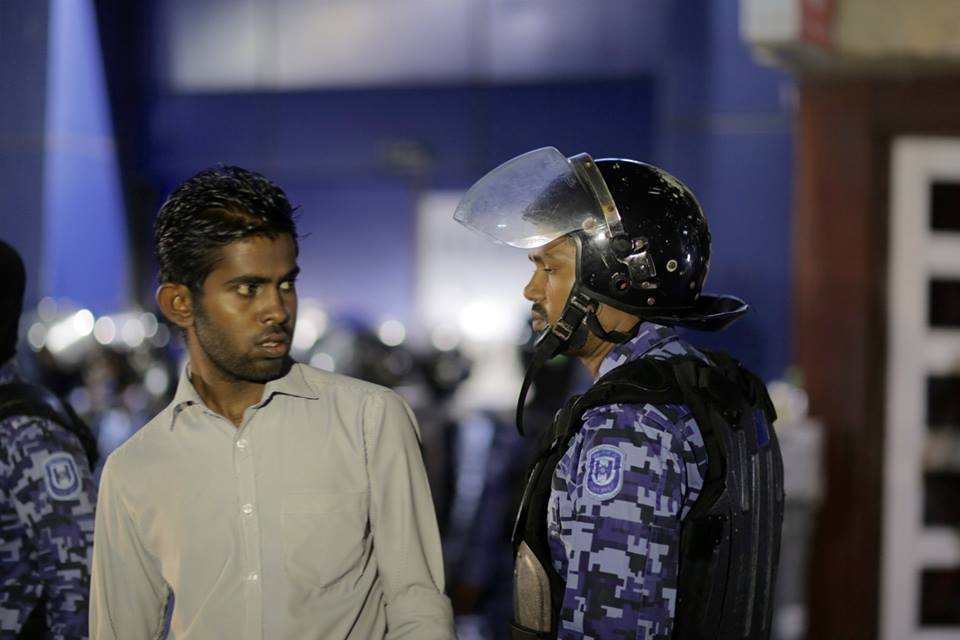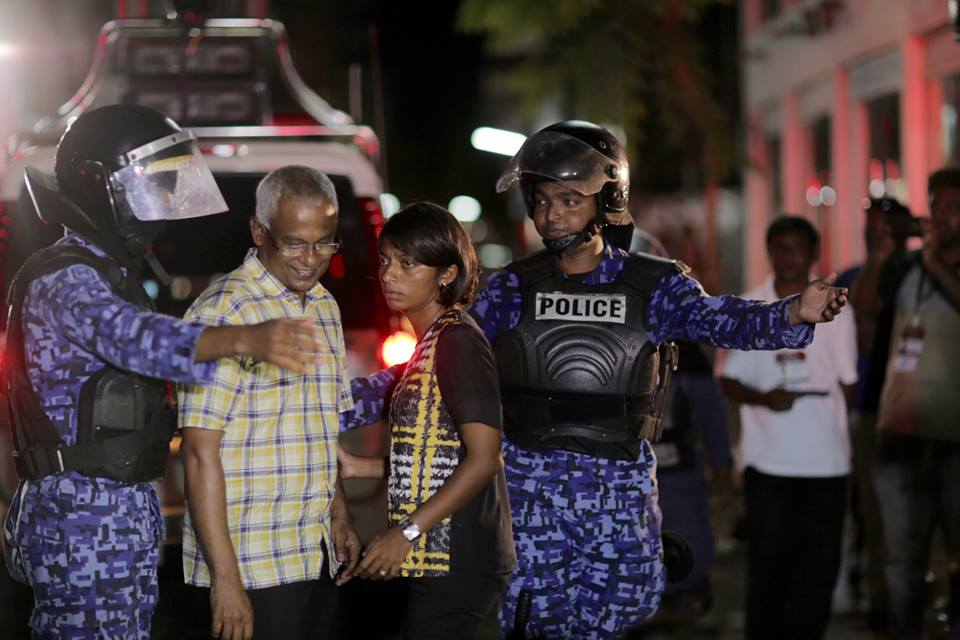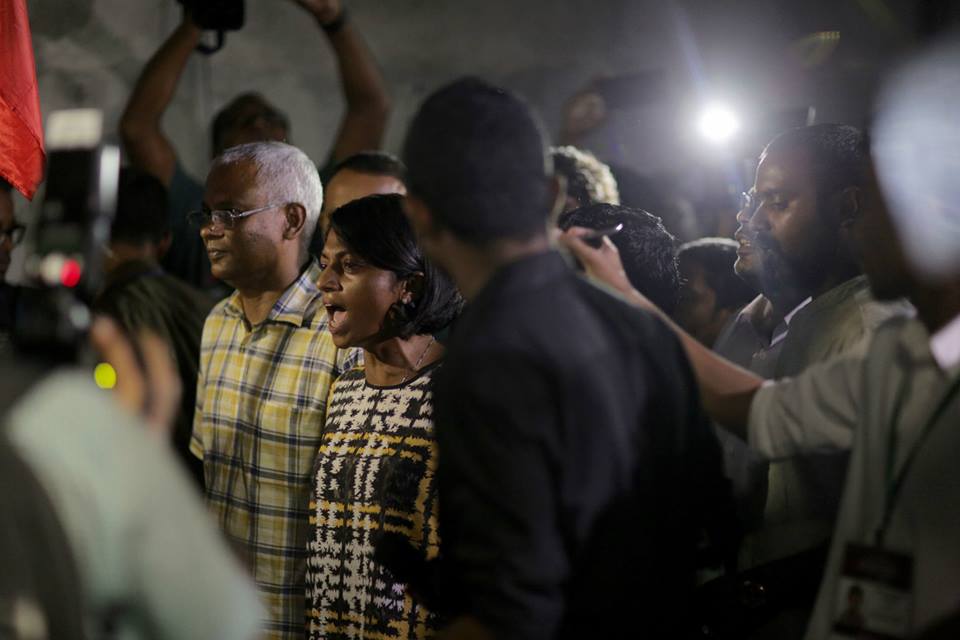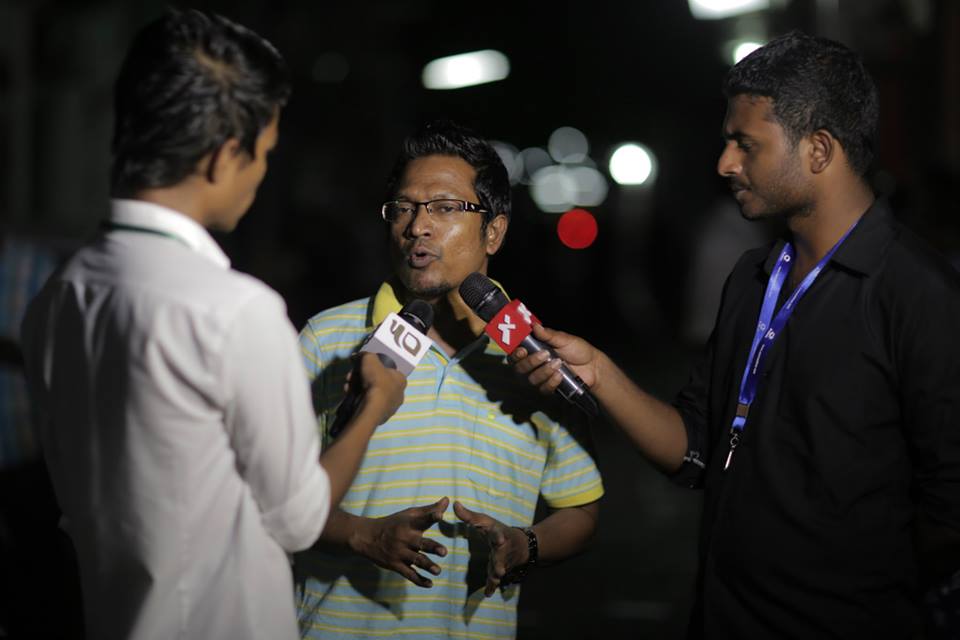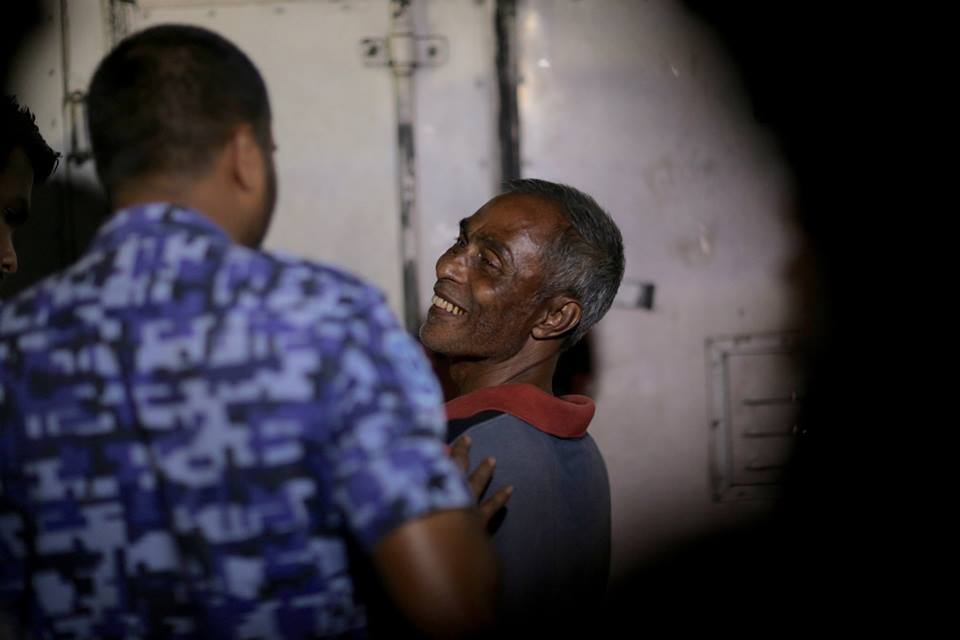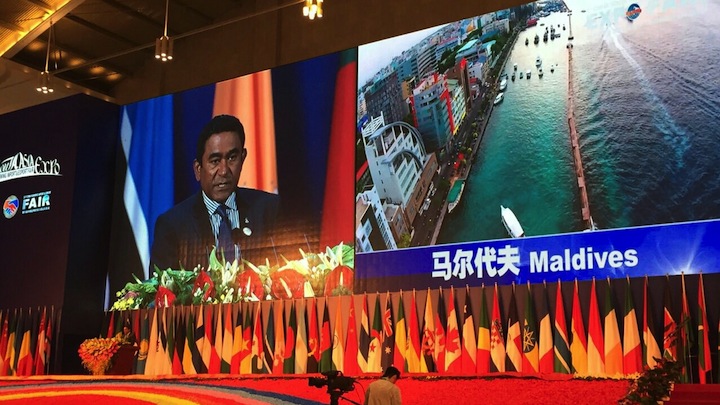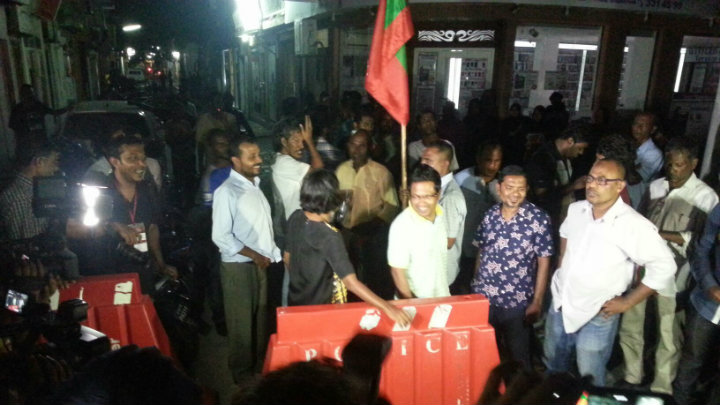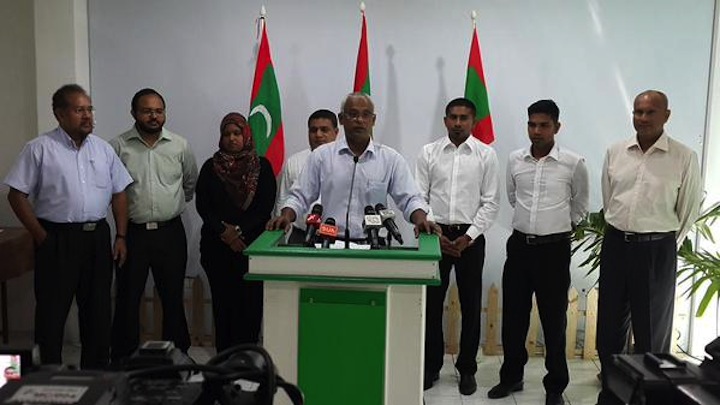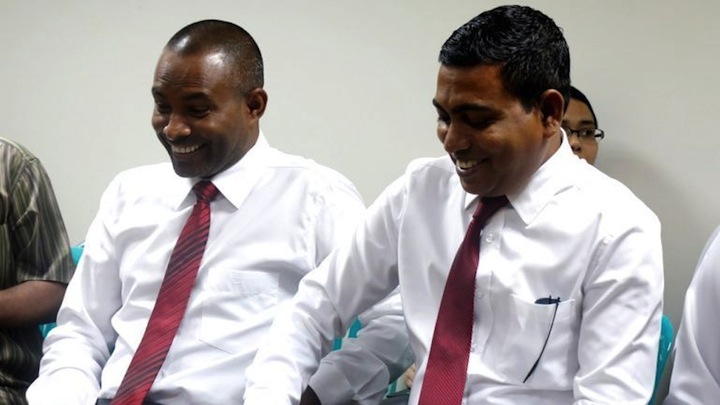Minivan News brings live coverage of an opposition sit-in on Malé’s thoroughfare Majeedhee Magu. This is the third mass anti-government protest this year. Organisers had notified the police that the sit-in may last for three days
3:50am: Minivan News ends live coverage.
3:40am: At least nine people have been arrested. The police have now dispersed protesters. The protest remained peaceful throughout.
MP Mahloof was arrested on charges of disobedience to order, the police have said.
3:20am: Several eyewitnesses have said they saw police arresting MP Ahmed Mahloof. Another young man, Ahmed Naeem, has also been arrested.
Minivan News journalists also saw some eight young men, who appear to be pro-government supporters, quarrel with protesters. They left on motorcycles shortly afterwards.
3:10am: Police have chased a man carrying a megaphone into the narrow lane where ex-president Nasheed’s paternal home is located. Police officers in regular blue uniforms are urging protesters to leave the area. Dozens of police officers in one lorry and two jeeps are patrolling the area.
Musthafa Luthfy, Shifaz and Mahloof spoke to the crowd previously, and urged supporters to continue to exercise their right to assemble peacefully. Speakers stop speaking the moment police arrive, but resume when police leave.
2:40am: Hundreds remain on the street. MP Ahmed Mahloof is reiterating the opposition’s demands to free jailed politicians, protect businesses and to end fear and intimidation on a megaphone.
2:20am: Some 200 protesters and leadership figures remain on Majeedhee Magu near the Malé City Hall. Dozens of police officers in two lorries and two jeeps are driving back and forth in the area. Musthafa Luthfy, ex-president Nasheed’s running mate in the 2013 presidential polls, says the leadership has not decided to end the protest and will continue as long as supporters are willing to remain on the street.
2:00am: MP Ahmed Mahloof says the protest is not over, and has called on protesters to regroup. The location is unclear at the moment.
1:50am: Minivan News journalists observed police approach the opposition leaders, and said the protest was unlawful and asked them to leave the area. The MPs posed some questions to the police, but showed no real resistance when police escorted them behind barricades.
1:40am: Opposition leaders appear to have ended the sit-in.
1:30am: Opposition leaders have stood up on police request, but were then escorted out of the Malé City’s central junction to a side street.
1:25am: Police have escorted MP Ali Azim out of the sit-in area and pushed him behind the barricades after he stood up to give an interview to Raajje TV. He said: “We want to see progress on talks with the government I believe we must continue our protest as long as members of the public continue their protests.”
1:00am: MP Ibu says the leadership is attempting to establish a connection with the protesters, while former environment minister Mohamed Aslam said he will remain on the street until he urinates on himself. SO officers are dispersing the remaining pockets of protesters in side streets.
12:55am: The speaker system on Ma. Maadheli, at the junction of Majeedhee Magu and Chaandhanee Magu has been switched off. The police have searched a security guard at the building. On May Day, the police entered the building and confiscated the speaker system there.
12:45am: A young man, Nazaal Shiyam, has been arrested for taking photos without a media pass. The police have restricted media to the pavements.
12:35am: The sitting opposition leaders include MPs Ali Azim, Eva Abdulla, Ibrahim Mohamed Solih, Imthiyaz Fahmy, Mohamed ‘Bigey’ Rasheed, Abdul Bari Abdulla, Abdul Ghafoor Moosa, and Ali Hussein, and former Environment Minister Mohamed Aslam.
12:25am: Leadership remain huddled together, sitting on the ground at the junction of Majeedhee Magu and Chaandhanee Magu. Police have chased most of the protesters down side streets. Protesters have reported two arrests.
12:15am: Police are using pepper spray to disperse protesters. Opposition leaders are continuing the sit-in. But protesters have been pushed east on Majeedhee Magu by a block.
12:10am: Police clad in riot gear are using shields to push back opposition leaders, who are sitting peacefully on the ground at the front lines.
12:00am: Police have issued a last warning. “Disperse now or we will use force. We will not take responsibility for any injuries caused.”

11:45pm: Opposition leaders are continuing to address the crowd using hidden sound systems on residential buildings in the area.
11:36pm: The police have warned they will break up the sit-in if protesters continue to use sound systems and disrupt traffic. Opposition leaders, however, are continuing to appeal to the crowd to remain on the street. Former MDP MP Ahmed Abdulla has denounced police actions and is continuing a chant for Nasheed, Imran and Nazim’s release.
11:23pm: The SO officers used pepper spray against some protesters and took away the three carts with the loudspeakers.

11:20pm: Specialist Operations (SO) walked into the crowd from two directions and have confiscated the sound systems.
11:15pm: Riot police approached the podium twice after 11:00pm and asked the leadership to stop using loudspeakers or sound systems. But the police did not attempt to confiscate the sound system and opposition politicians are continuing their speeches.

11:00pm: Foreign minister Dunya Maumoon in a tweet urged the protesters to end the sit-in by midnight, while home minister Umar Naseer said the low turnout was an indication that “people prefer peace and stability.”
10:50pm: Opposition leaders are addressing some 2,000 supporters. In their speeches, MP Ahmed Mahloof, MDP MP Abdulla Shahid and former minister of Islamic affairs Dr Abdul Majeed Abdul Bari, appealed to supporters to remain steadfast and called on the government to c.
Traffic is flowing in side-streets.
JP leader Qasim Ibrahim, in several tweets, distanced himself from the MDP protest, and appealed to his employees to stay away from the sit in.
In the first tweet he said: “The rumor that I called on [the public] to join the ongoing MDP protest is a lie.”
In the second tweet he said: “JP did not join the ongoing protest by MDP, and will not do so in the future.”
In the third, he said: “It is Gasim’s appeal that no Villa employees join the MDP protest.”
10:38pm: Jumhooree Party MP Ali Hussain is speaking now.
Adhaalath Party council member Shidhartha Shareef addressed the crowd after Shifaz’s speech. She repeated the demands for an end to the government’s “tyranny” and urged the public to join the sit-in.
Volunteers are distributing juice and water among the crowd.
10:14pm: Ibu has called on the government to release imprisoned opposition politicians, drop terrorism charges against Adhaalath Party leader Sheikh Imran and JP deputy leader Ameen Ibrahim, stop targeting opposition-aligned businesses, and ensure job security for opposition supporters.
The opposition protests will continue serially until the demands are met, Ibu announced to cheers from the crowd.
MDP vice president Mohamed Shifaz is now speaking.

10:10pm: Ibu’s speech was briefly interrupted after riot police officers approached the MDP parliamentary group leader. The police officers have since left and Ibu has resumed his speech. A “dark autocratic cloud” is growing over the Maldives and “rule by law” prevails instead of rule of law, he said.

10:03pm: A podium has been set up at the Chandhanee Magu-Majeedhee Magu junction and protesters have sat down following announcements. MDP MP Ibrahim Mohamed Solih ‘Ibu’ is addressing the crowd.


9:55pm: The protest march has turned into Chandhanee Magu and the front line has stopped near the Asrafee bookshop. There are no police barricades blocking the path, but some police officers are on the road and appear to be diverting traffic.
9:42pm: The front line has moved past the former city council office and the tail end is near the national stadium. More people are joining the march. The crowd is festive and chanting for the release of “political prisoners.” National songs are blaring from the sound systems.
9:33pm: The protest march has reached the national stadium with the tail end near the prosecutor general’s office. Protesters are calling for the release of former President Mohamed Nasheed and ex-defence minister Mohamed Nazim.
Minivan News estimates the size of the crowd is approximately 1,500. The protesters are divided into groups with a cart carrying a sound system and water for each group. Each group is led by a designated leader.
A police van is moving ahead of the front line and had stopped at the Sosun Magu-Majeedhee Magu junction, halting the march for about 20 minutes. The police van is now moving forward slowly.

9:15pm: Protesters have started marching west on Majeedhee Magu, streaming out of the artificial beach. MDP leaders are at the front line with former MP Ali Azim bearing a national flag. Many protester are carrying national flags. The atmosphere is calm.

Before heading out, former MDP vice presidential candidate Dr Musthafa Luthfy said protesters will march in rows of seven or ten and sit down in a location at Majeedhee Magu. If the police crack down and disperse the crowd, he urged protesters to regroup on the main road.
8:55pm: MDP vice president Mohamed Shifaz said: “We are ready for a calm, peaceful sit-in.” Adam Azim, the brother of ex-defence minister Mohamed Nazim, has called on the security forces to show restraint and denounced “insincere calls for talks by President Yameen.”
Some 500 people have now gathered at the Artificial Beach area.
8:45pm: The youth wing of the opposition coalition, Heylaa, is collecting donations to pay over US$7000 in fines levied by the Elections Commission. The commission said the MDP and Adhaalath Party had violated political party laws during the May Day protest, after violent clashes broke out between protesters and police at dusk.

8:35pm: Foreign Minister Dunya Maumoon, in a tweet, said she hoped the opposition will be responsible.
The sit-in is taking place in a more conciliatory political environment than May 1.
The allied opposition parties have welcomed President Yameen’s call for talks. The Jumhooree Party, the first to meet with government representatives last week, asked the government to facilitate joint talks between all parties. They have also requested the government to free opposition politicians in jail or facing criminal prosecution, ensure judicial independence and protect investors.
Opposition MPs have also ended a three-month long protest in the People’s Majlis.
8:30pm: Some 250 people have now gathered at the opposition haruge at the Artificial Beach. The atmosphere is festive. National songs are blaring on speakers. The makeshift masks for tear gas and pepper spray seen at the May Day protest are absent. Most supporters are in casual wear.
8:15pm: Dozens have started gathering at the Artificial Beach area for the opposition’s third mass anti-government protest this year. Organizers say they plan to hold a prolonged sit-in at Malé’s thoroughfare Majeedhee Magu.
The police have asked the main organizer, the Maldivian Democratic Party (MDP), to end the sit-in by midnight, and have banned the use of speaker systems beyond 11pm.
Hugo Swire, the UK minister of state for foreign and commonwealth office, in a tweet urged restraint, and said he has spoken to Foreign Minister Dunya Maumoon on the issue.
The Maldivians Against Tyranny coalition is protesting over the imprisonment of ex-president Mohamed Nasheed and ex-defence minister Mohamed Nazim in trials widely criticized for lack of due process.
A third concern is the government’s sanctions on businesses belonging to Jumhooree Party leader and tourism tycoon Gasim Ibrahim. The tax authority has frozen some of his Villa Group accounts over a controversial US$90.4million fine.
Nasheed’s wife, Laila Ali, will join tonight’s sit-in.
President Abdulla Yameen is in China and is set to return on June 16.
The MDP has said the rally will be peaceful and notified the police that the protest may last for three days.
Chief Superintendent of police Abdulla Nawaz warned the police will “stop any criminal activities that may happen in the protest.”
“The police, under no circumstances, have said protesting is banned. Police will not say that you cannot protest for three, four or five days. But we will take the necessary steps to ensure safety from any issues that arise,” he told the press at a press conference this evening.
He pledged police cooperation if the protest remains peaceful.
Likes (2)Dislikes
(2)Dislikes (0)
(0) 